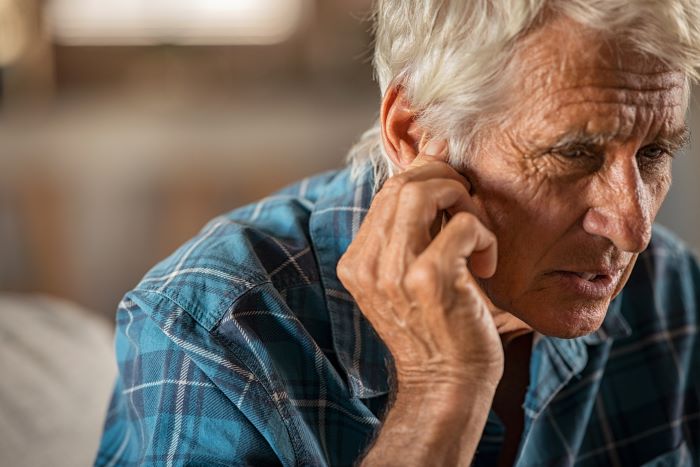With age comes wisdom and, usually, so does hearing loss. The gradual nature of age-related hearing loss, or presbycusis, can make it difficult to notice. Understanding presbycusis and its causes will help you protect your hearing and find the right treatment.
What is Presbycusis?
It’s a type of hearing loss that happens naturally over time. Presbycusis usually occurs in both ears and affects your ability to hear high-frequency sounds, like women’s and children’s voices.

What Causes Presbycusis?
Changes in your outer, middle and inner ear may lead to presbycusis. Damage to the auditory nerve and pathways from your inner ear to your brain can come with age, negatively affecting your hearing ability.
Long-term exposure to noises louder than 85 decibels is a common cause of age-related hearing loss. Sources of those sounds include motorcycles, food processors, concerts, sirens, jet engines, firearms and fireworks.
You may also be at an increased risk of presbycusis due to certain genetic factors and health conditions. High blood pressure, heart disease and diabetes have been linked to hearing loss.
Taking certain medications might also contribute to hearing loss. Ototoxic medications include drugs used for chemotherapy, quinine, aspirin and diuretics.
Symptoms of Age-Related Hearing Loss
- Difficulty hearing conversations amid background noise
- Speech sounding muffled or quiet
- Trouble distinguishing “s” and “th” sounds
- Tinnitus, a ringing or hissing in one or both ears
Why People Ignore Age-Related Hearing Loss
Presbycusis happens over time and its symptoms are often mistaken for another condition or overlooked completely. Your loved ones might notice your hearing loss before you do, so it’s important to take note of their observations.
It’s also not unusual to not want to admit you have hearing loss, as you may feel it’s an indicator of getting older. However, hearing loss is extremely common in adults and is even becoming a growing problem in teens and young adults due to the use of earbuds.
You may think wearing hearing aids could draw more attention to you, making you feel self-conscious. However, today’s hearing aids are modern pieces of technology that resemble Bluetooth devices and earbuds. Many of today’s hearing aid styles fit inside your ear canal and are practically invisible, so other people won’t even know you’re wearing them.
Hearing loss affects people from all walks of life, including celebrities and public figures. Stephen Colbert and Halle Berry both live with hearing loss, while Bill Clinton, Huey Lewis and Whoopi Goldberg all wear hearing aids.
How to Prevent Presbycusis
You run the risk of losing more of your hearing if you live with untreated presbycusis. It’s important to identify potential sources of hearing damage, especially loud noises. Wearing hearing protection like foam earplugs and over-ear headphones in noisy places reduces your risk of sustaining permanent hearing loss.
Review your medications with your primary care physician to determine if any of them are ototoxic. Your doctor may recommend visiting an audiologist so you can receive a physical ear exam and take an audiogram. That test includes listening to different tones and pitches in a soundproof booth to identify your degree of hearing loss.
Can You Treat Age-Related Hearing Loss?
Addressing presbycusis depends on your type of hearing loss. If you have conductive hearing loss (caused by a blockage), your audiologist can remove the blockage or treat the infection that’s blocking your middle ear. Sensorineural hearing loss (caused by damage to the inner ear or nerves) is typically irreversible and requires the use of assistive listening devices, hearing aids or cochlear implants.
Presbycusis Treatment in NYC, Scarsdale & Stamford
Audio Help Hearing Centers offers comprehensive audiology services in New York City and Scarsdale, New York, and Stamford Connecticut. Our expert doctors of audiology are committed to providing personalized hearing healthcare to ensure you receive the treatment you need to lead a full life. We’ve been helping patients hear better for more than 30 years.
Call 888-832-9966 or schedule your appointment online.

